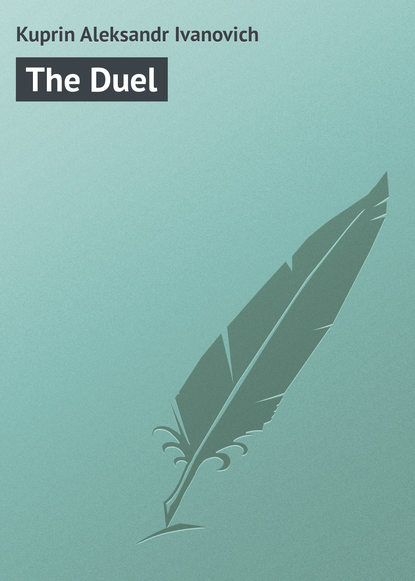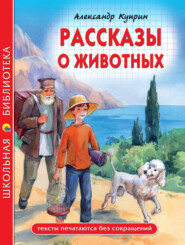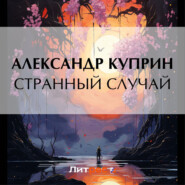По всем вопросам обращайтесь на: info@litportal.ru
(©) 2003-2024.
✖
The Duel
Настройки чтения
Размер шрифта
Высота строк
Поля
“No; it was only by accident I got to know it.”
They were both silent. In the sky the first stars began to light up and display themselves to the eye as little, trembling, emerald, sparkling points. From the right you might hear a weak echo of voices, laughter and the strains of a song; but in all the rest of the wood, which was sunk in soft, caressing darkness, reigned a deep, mysterious silence. The great blazing pyre was not visible from this spot in the woods, but the crests from the nearest oaks now and then reflected the flaming red glow that, by its rapid changes from darkness to light, reminded one of distant and vivid sheet-lightning. Shurochka softly and silently caressed Romashov’s hair and face. When he succeeded in seizing her fingers between his lips, she herself pressed the palm of her hand against his mouth.
“I do not love my husband,” she said slowly and in an absent voice. “He is rough, indelicate, and devoid of any trace of fine feeling. Ah, I blush when I speak of it – we women never forget how a man first takes forcible possession of us. Besides, he is so insanely jealous. Even to-day he worries me about that wretched Nasanski. He forces confessions from me, and makes the most insignificant events of those times the ground for the wildest conclusions. Ah – shame, he has unblushingly dared to put the most disgusting questions to me. Good God! all that was only an innocent, childish romance, but the mere mention of Nasanski’s name makes him furious.”
Now and then, whilst she spoke, a nervous trembling was noticeable in her voice, and her hand, still continuing its caress, was thrilled, as it were, by a shudder.
“Are you cold?” asked Romashov.
“No, dear – not at all,” she replied gently. “The night is so bewitchingly beautiful, you know.” Suddenly, with a burst of uncontrollable passion, she exclaimed, “Oh, my beloved, how sweet to be here with you.”
Romashov took her hand, softly caressed the delicate fingers, and said in a shy, diffident tone:
“Tell me, I beg you. You have just said yourself that you do not love your husband. Why, then, do you live together?”
She arose with a rapid movement, sat up, and began nervously to pass her hands over her forehead and cheeks, as if she had awakened from a dream.
“It’s late; let us go. Perhaps they are even now looking for us,” she answered in a calm and completely altered voice.
They got up from the grass, and both stood for a while silent, listening to each other’s breathings, eye to eye, but with lowered gaze.
“Good-bye,” she suddenly cried in a silvery voice. “Good-bye, my bliss – my brief bliss.”
She twined her arms round his neck and pressed her moist, burning-hot lips to his mouth. With clenched teeth and a sigh of intense passion she pressed her body to his. To Romashov’s eyes the black trunks of the oaks seemed to reel and softly bend towards the ground, where the objects ran into each other and disappeared before his eyes. Time stood still…
By a violent jerk she released herself from his arms, and said in a firm voice:
“Farewell – enough. Let us go.”
Romashov without a sound sank down on the grass at her feet, embracing her knees, and pressing his lips against her dress in long, hot kisses.
“Sascha – Saschenka,” he whispered, having now lost all self-command, “have pity on me.”
“Get up, Georgi Alexandrovich! Come – they might take us unawares. Let us return to the others.”
They proceeded on their way in the direction from which they heard the sound of voices. Romashov’s temples throbbed, his knees gave way, and he stumbled like a drunken man.
“No, I will not,” Shurochka answered at last in a fevered, panting voice. “I will not betray him. Besides, it would be something even worse than betrayal – it would be cowardice. Cowardice enters into every betrayal. I’ll tell you the whole truth. I have never deceived my husband, and I shall remain faithful to him until the very moment when I shall release myself from him – for ever. His kisses and caresses are disgusting to me, and listen, now – no, even before – when I thought of you and your kisses, I understood what ineffable bliss it would be to surrender myself wholly to the man I love. But to steal such a joy – never. I hate deceit and treacherous ways.”
They were approaching the spot where the picnic had taken place, and the flames from the pyre shone from between the trees, the coarse, bark-covered trunks of which were sharply outlined against the fire, and looked as if they were molten in some black metal.
“Well,” resumed Romashov, “if I shake off my sluggishness, if I succeed in attaining the same goal as that for which your husband is striving, or perhaps even something still higher – would you then …?”
She pressed her cheek hard against his shoulder, and answered impetuously and passionately —
“Yes, then, then!”
They gained the open. All the vast, burning pyre was visible; around it a crowd of small, dark figures were moving.
“Listen, Romochka, to still another last word.” Shurochka spoke fast, and there was a note of sorrow and anguish in her voice. “I did not like to spoil this evening for you, but now it must be told. You must not call at my house any more.”
He stopped abruptly before her with a look of intense astonishment. “Not call? But tell me the reason, Sascha. What has happened?”
“Come, come; I don’t know, but somebody is writing anonymous letters to my husband. He has not shown them to me, only casually mentioned several things about them. The foulest and most disgusting stories are being manufactured about you and me. In short, I beg you not to come to us any more.”
“Sascha,” he moaned, as he stretched out his arms to her.
“O my friend, my dearest and most beloved. Who will suffer more from this than I? But it is unavoidable. And listen to this, too. I am afraid he is going to speak to you about this. I beseech you, for God’s sake, not to lose your temper. Promise me you won’t.”
“That is all right; don’t be afraid,” Romashov replied in a gloomy tone.
“That is all. Farewell, poor friend. Give me your hand once more and squeeze mine tight, quite tight, till it hurts. Oh! good-bye, darling, darling.”
They separated without going closer to the fire. Shurochka walked straight up the slope. Romashov took a devious path downwards along the shore. The card-playing was still going on, but their absence had been remarked, and when Romashov approached the fire, Ditz greeted him so insolently, and with such a vulgar attack of coughing in order to draw attention, that Romashov could hardly restrain himself from flinging a firebrand at his face.
Directly after this he noticed that Nikoläiev left his game, took Shurochka aside, and talked to her for some time with angry gestures and looks of hatred. Suddenly she pulled herself together, and answered him in a few words with an indescribable expression of indignation and contempt on her features. And that big, strong man all at once shrivelled up humbly in her presence, like a whipped hound which obediently goes its way, but gnashes its teeth with suppressed fury.
The party broke up soon after this. The night felt chilly, and a raw mist rose from the little river. The common stock of good humour and merriment had long been exhausted, and all separated, weary, drowsy, and without hiding their yawns. Romashov was soon once more sitting in his trap, opposite the Misses Michin, but he never uttered a word during the course of the journey. Before his mind’s eye still stood the mighty dark and silent trees and the blood-red sunset over the brow of the woodland hill. There, too, in the soft, scented grass, he saw beside him a female shape robed in white, but during all his intense, consuming pain and longing, he did not fail to say of himself, pathetically —
“And over his handsome countenance swept a cloud of sorrow.”
XIV
IN May the regiment went into camp, which, year after year, was pitched in the same spot outside the town, and not far from the railway. The young officers had, whilst the camp was on, according to the regulations, to live in wooden barracks near their respective companies; but Romashov continued to enjoy his own dwelling in the town, as the officers’ barracks of the 6th Company had long been in a ruinous and uninhabitable condition, on account of there being no money available for repairs. Every day he had to journey four times between the town and the camp. In the morning off to the camp for drill, thence back to the officers’ mess in the town for his dinner; after that, off to the afternoon exercises, and, finally, at night, his last walk back to his home. This fatiguing life was seriously affecting his health. After the first fortnight he began to get thin and hollow-eyed, and soon lost the fresh colour of his cheeks.
Even the rest, officers as well as men, fared little better. Preparations were being made for the great General Review, and nobody ventured to speak of fatigue or weariness. The Captains of companies exhausted the utmost strength of their men by two or three hours’ extra drill every day. During all the drill the smacking sound of ears being boxed and other maltreatment was heard all over the plain. More than once Romashov noticed how the Captains, in a furious rage, like wild beasts, attacked the poor recruits, and boxed the ears of the entire line from first to last; but, nevertheless, the “non-coms.” displayed the greatest cruelty. They punished with unbridled rage the slightest mistake in marching or manual exercise; teeth were knocked out, drums of the ears were broken, and the defenceless victims were thrown down senseless. But none of all these martyrs ever entertained the thought of drawing a sword. It was just as if the whole regiment had become the prey of a wild hypnosis or had been attacked by nightmare. And all these terrors and sufferings were multiplied by a fearful heat, for May this year was unusually hot.
Wherever you went an unnatural nervousness was discernible. The most absurd quarrels would, all of a sudden, break out during meals at the officers’ mess. They insulted each other, and sought quarrels without rhyme or reason. The soldiers, with their sunken cheeks and sallow eyes, looked like idiots. Never, during the few hours’ rest they were allowed to enjoy, was a laugh heard from the tents; never a joke. At night, after bugle-call, the rank and file were ordered to get into line for games and singing, and with an absolutely apathetic expression of voice and features they howled the old campsong —
“Oh, the gallant Russian soldier,
Fear with him can find no place;
He, when bombs are bursting round him,
Calls them ‘brother’ to their face.”
Then a dance would be played on the harmonium, and the ensign would roar out —
“Gregorash, Skvortzov, up and dance, you hounds!”
The two recruits obeyed the order without a murmur, but in both their song and dance there lay something dead, mechanical, and resigned, at which one was inclined to weep.
Only in the 5th Company were they easy-going and free, and there the drills began every day an hour later than the rest and were concluded an hour earlier. You might have fancied that every member of it had been specially chosen, for they all looked lively, well-fed. The lads of the 5th Company looked their officers bravely and openly in the face, and the very rubashka[19 - A light jacket worn in the hot weather.] was worn with a certain aristocratic elegance. Their commander, Stelikovski – a very eccentric old bachelor and comparatively rich (he drew from some unknown quarter two hundred roubles every month), was of an independent character, with a dry manner, who stood aloof from his comrades, and lastly, was in bad odour on account of his dissolute life. He attracted and hired young girls from the lower class, often minors, and these he paid handsomely, and sent back to their native places after the lapse of a month. Corporal punishment – nay, even threats and insulting words – were strictly forbidden in his company, although, as far as that goes, there was by no means any coddling of the men, who, however, in appearance, and readiness, and capability, were not inferior to any company of guardsmen in existence. Being himself masterful, cool, and self-reliant in the highest degree, he was also able to implant those qualities firmly in his subordinates. What, in other companies, could not be attained after a whole week’s drill amid threats, yells, and oaths, blows and stripes, Stelikovski attained with the greatest calm in a single day. He was a man of few words, seldom raised his voice, and when, on occasion, he did speak, the soldiers stood as if carved in stone. Among the officers he was shunned and hated, but worshipped by his men – a state of things that, most certainly, was unique in the whole of the Russian Army.
At length the 15th of May arrived, when the Great Review, ordered by the Brigadier-General, was to take place. In all the companies, except the 5th, the non-coms. had their men drawn up by 4 a.m. The poor, tortured, drowsy, gaping soldiers were trembling as though with cold in their coarse shirts, although the air was mild and balmy and the weather serene, and their gloomy, depressed glances and sallow, greyish, chalky faces gave a painful impression in the gleaming, bright summer morning.
When the clock struck six, the officers began to join their companies. The regiment had not to be assembled and in line before 10 a.m., but, with the exception of Stelikovski, not one of the Captains thought of letting their poor wearied soldiers have their proper sleep and gain strength for the toils awaiting them that day. On the contrary, never had their fussiness and zeal been greater than on this morning. The air was thick with oaths, threats, and insults; ear-boxing, slaps on the mouth, kicks, and blows with the fist rained down, at each slightest blunder, on the miserable, utterly exhausted soldiers.
At 9 a.m. the companies marched to the parade-ground, about five hundred paces in front of the camp. Sixteen outposts, provided with small, multi-coloured flags for signalling, were stationed in an absolutely straight line about half a verst long, so as to mark out, with mathematical accuracy, the points where each company’s right wing should be placed at the parade past the Brigadier-General. Lieutenant Kováko, who had been allotted this highly important task, was, of course, one of the heroes of the day, and, conscious of this, he galloped, like a madman – red, perspiring, and with his cap on his neck – backwards and forwards along the line, shouting and swearing, and also belabouring with his sabre the ribs of his lean white charger. The poor beast, grown grey with age and having a cataract in its right eye, waved its short tail convulsively. Yes, on Lieutenant Kováko and his outposts depended the whole regiment’s weal and woe, for it was he who bore the awful responsibility of the sixteen companies’ respective “gaps” and “dressing.”

















